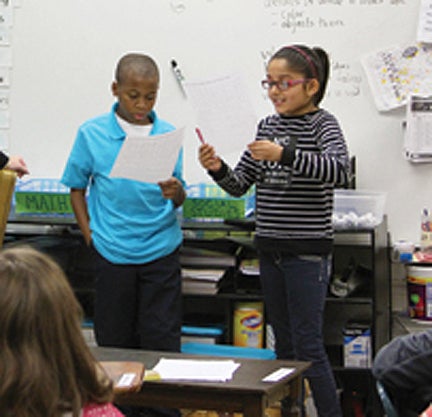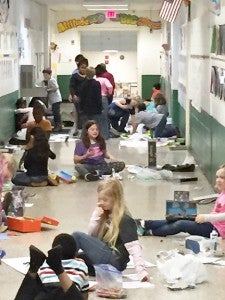Furlow Charter School takes hands-on approach in education of local youths
Published 7:40 am Saturday, March 12, 2016

- Michael Murray/Americus Times-Recorder: Fourth-grade students at FCS practice their French language skills, supervised by foreign language teacher, Joanna Arnold. In this photo, the children are presenting a skit to their classmates.
By MICHAEL MURRAY
AMERICUS – Seven months after opening the school’s doors to students for the first time, the faculty and staff at the Furlow Charter School (FCS) have seen their share of difficulties and successes.
FCS principal, Valerie Duff and Chair of the school’s Governing Board, Elizabeth Kuipers recently sat down to talk with the Times-Recorder about the school’s current progress and what the institution has in store for the future.
Asked about her experiences at the school since taking the principal position, Duff told the Times-Recorder, “It’s amazing… We have some challenges that we’re going to get straightened out, but I am thrilled with what’s been happening in the classrooms… the teaching and learning.”
Duff recently came out of a four-year retirement to take the reins at the institution. “It was kind of like riding a bicycle. It just feels really natural,” she said.
She went on to say that her experiences at FCS have been very different from what she saw in her previous position as principal of Sumter County Primary School.
“The project-based learning is a really different approach,” Duff said before offering an example of the different type of approach to education that FCS employs from that very morning.
“[Mrs. Brewer’s class] is working on a lesson on animal habitats,” she explained. While in a typical classroom, an observer might expect to see children in desks, pencils in hand, busily identifying the differences in habitats, Duff’s description painted a very different picture.
“The whole class was out in the hall this morning,” she said. “Each kid has a rubric that they have to meet the standards for… they have to show [what they’ve learned]. Some of them are making dioramas. Some of them are creating posters or other types of models. That’s the kind of thing that our kids are engaged in.”

Submitted by Furlow Charter School:
Furlow Charter School students spread out in the school’s hallway to make room for their projects as they create posters and dioramas to show their knowledge of animal habitats.
According to research, these types of teaching methods encourage students to gather information in multiple ways, through hands-on activities. Many schools of thought believe this to be a superior method of education, focusing on knowledge retention as instructors incorporate lessons directed at a variety of learning styles, ensuring that every student has an opportunity to experience the curriculum in the way that best suits his or her needs.
“[The students] are using lots of modalities. It’s not just about listening and writing. We do a lot of integration of art and that sort of thing in those projects as well… It is engaging for [the students],” Duff continued. “There is not a whole lot of sitting in a desk pushing a pencil going on around here, which is how I think it ought to be.”
In its first year with the Sumter County School District, the school has filled up very quickly.
“We are almost at capacity,” Kuipers told the Times-Recorder. “Our numbers vary slightly, but we are currently at about 400 students. Our capacity was capped at 410, so we really are very close.”
The school currently serves grades K-8.
“Next year, we’ll add the ninth grade,” Kuipers continued. “Our capacity will go up by about 50 students so, next year, we should have about 460… That’s very exciting.”
As the years progress, FCS will go on to serve grades 10-12.
“We have a five-year charter with the state and we’ll be serving grades K-12 at the end of that period,” Kuipers stated.
Since the Furlow Charter School is a fully public institution, kindergarten enrollment is determined by a lottery system as mandated by state law.
Once a student is enrolled in FCS, that student is automatically eligible to attend through the end of the student’s preparatory education. Siblings of students attending the school are automatically eligible for enrollment as well.
Duff went on to say that FCS follows the same common core standards as other educational institutions in Georgia, as required by state law.
“We have to follow that,” Duff said. “We have to participate in the state testing that is required of any other public school so we’ll be doing Georgia Milestones just like all of the others. We will be held accountable based on our performance on those tests.”
“In our charter, we set goals that would have us exceeding the district performance by a certain number of percentage points each year,” she continued. “That margin will increase over the five years. We also have to out-perform the state average. We have some pretty lofty goals to meet. We would be at risk of losing our charter if we are not able to make those kinds of gains… The kids are doing great things. They really are,” Duff concluded.
Of course, no educational institution with such lofty goals could hope to be successful without the hard work of a very dedicated faculty. The school currently employs around 25 faculty members. About one third of the FCS faculty has previously worked in the Sumter County School District.
In the interview, Duff praised the school’s bare-bones staff and discussed a few of the obstacles that the current faculty has faced while embarking on this new endeavor.
“The teachers that we have… They had to make sacrifices to come work here. We don’t get federal funding the first year… that’s something that lags a year behind,” Duff stated. “We still have to provide those services, however, like special education and the ESOL program [for non-native English speakers] and others. We have to have the money to provide these services so we had to start out the teachers making less than they would make if they were teaching anywhere else.”
“They also often work longer hours,” Kuipers added.
Exemplifying the dedication to the school’s mission that she has seen from the current faculty, Duff discussed the fact that many of the school’s teachers spent part of their summer painting classrooms and cleaning carpets in anticipation of the school’s opening in early August. “They are very committed to what they’re doing and believe in what we’ve set out to do at the Charter School,” she said. “I’m really proud of that.”
Though funding for FCS has been sparse, faculty members have had to do some creative thinking to ensure that their classrooms were ready for the students in August. According to Kuipers, the school’s initial funding was not issued until late July.
“We opened the doors on August 3 for 400 children. We had no money to buy furniture so the teachers built some of their own furniture,” Kuipers said. We bought furniture at the [Habitat for Humanity] Restore. You can walk into some rooms and see a dining room table that we bought at the Restore or a board attached to the wall that works as a cafe-style seating for the students. [Some of the teachers] used wooden palettes to make tables and chairs and all kinds of stuff. There was a lot of hard work going on this summer. The teachers have just been amazing in the way that they’ve jumped in and done their part.”
“In one of our classrooms, they have exercise balls, the kind that people use to do yoga,” Duff added. “Those are the kids’ seats. She has 24 of them in there. That’s what the kids sit on. It really goes well along with the whole brain-based approach to learning.”
Further on this topic, Kuipers said, “You can walk into some of the classrooms and think, ‘This doesn’t even look like a classroom. Where are the desks?’ It’s a classroom made up of stations and the students move around between 12 different stations throughout the course of the day.”
That style of out-of-the-box thinking has greatly benefited the teachers in the classroom over the past several months as well.
“They have been really creative with the curriculum because we didn’t give them any textbooks,” Kuipers stated. “They’re creating their units out of things that they’re finding. All of our books in the media center are books that were donated or were salvaged when the other schools were going to throw them away.”
“We have lots of hand-me-downs,” Duff went on to say. “It’s not ‘pretty’, but it’s functional.”
“We also had a fabulous celebration of learning a couple of weeks ago…,” Kuipers stated. “Student work was on display. It was kind of like an open house. The parents were welcomed to come, but it was the children who walked the parents through, telling them about their work and working through their portfolios and showing the progress that they have made over the course of the year… the things that they have learned. I have a sixth-grader and a fourth-grader here. It’s a night and day difference between the kind of open houses that experienced before.”
Duff added, “The scholars were actually leading instead of the teacher being the one that’s saying, ‘This is what we’re doing…’ It was the scholars saying, ‘This is my work. This is how I show what I now…’”
The FCS faculty has designed the school’s curriculum to address the state-mandated objectives as well as provide the students with other outlets to receive a well-rounded education, ensuring their successes as they move on to higher education. Aside from the standard subjects such as mathematics, language arts, science, and social studies that the students are required to take, every student at FCS attends classes in French and Spanish each year. Starting in kindergarten, the students take courses in one of these languages for the first half of the year and switch to the other in the second half of the year.
“You walk into classrooms and things are often labeled trilingually, which is just amazing and exciting to see,” Kuipers said. “To hear [the students] greet the professor in French and Spanish as they see her in the hall is really a very cool thing.”
All FCS students also take music and art classes. “They have either music or art every day,” Kuipers added. “And P.E. every day, which is a far cry from what is happening in the other district schools. We’re very proud of some of those innovations.”
Duff went on to state that the school’s eighth graders are currently earning high school credit in foreign language. They are taking Spanish for the whole year.
Despite some of the issues with funding that FCS has faced, several businesses in the community have made generous donations to the institution. “We’ve gotten some grants,” Kuipers told the Times-Recorder. “We received $10,000 from the Mattie Marshall Foundation, $5,000 from Sumter EMC, $5,000 from Citizen’s Bank, and $2,000 from Agrium.”
Part of the money from these grants will go towards garden plots for the classes to plant as they learn about the life cycles of plants.
“Each class is gong to have a garden,” Kuipers said. “We recently built the frames for the raised-bed gardens… and they’ll start a unit on living things, depending on the level of the curriculum, in which they’ll actually plant something as soon as it warms up enough to have a spring garden… We hope to extend that, as time and space permit, so that each classroom can have their own garden.”
According to Kuipers, the Furlow Charter School’s Facebook page includes regular updates about projects that the students are doing and pictures of the students at work.





